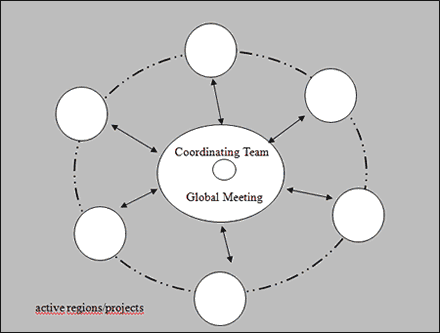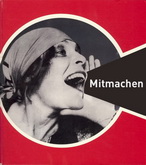



|
A global workers' network
tie is a global grassroots network of workers active in workplaces and communities.
It includes both union and non-union activists in the formal and informal sectors.
tie aims to encourage, organise, and facilitate international consciousness and cooperation among workers and their organisations in various parts of the world.
tie was founded in 1978 by initiative of union activists from various countries. Today, tie is active with regional groups in Bangladesh, Brazil, China, Colombia, France, Germany, India, Mali, Morocco, Mozambique, Nigeria, South Africa, Sri Lanka, and Turkey. From its beginnings, the tie network has linked up with workers initiatives that see themselves as part of a broader movement for social change committed to fight for a life without exploitation and exclusion – a life grounded in the dignity of human beings and their freedom for self-determination.
Click on the following links to get more informations on the subjects
tie supports an international exchange of information and experiences among worker activists, women’s and human rights groups. tie takes into account that women form the majority of the global workforce. tie’s activities are geared to enable workers to engage in a process of self-organisation, to develop their own strategies for better working and living conditions, and to facilitate solidarity locally and globally.
We see solidarity and self-organisation as important instruments for fighting back. They enable workers to experience empowerment to change their world for the better. Solidarity and self-organisation are the basis for mutual help between equal partners, brothers and sisters explicitly aiming to overcome existing divisions such as racism and sexism.
tie is a politically independent organisation rooted both in the global South and North. This enables us to initiate joint struggle and to maintain stable links between social and labour movements in different countries. tie has a long history of facilitating both exchange and implementation of fight-back strategies learned through international exchange projects and programmes by activists.
tie organises local, regional, and international conferences, exchange visits, and education seminars on a regular basis in order to:
- help participants gain a deeper understanding of the process of globalisation and the restructuring of work and production
- support an exchange of experiences on workers’ response towards these changes
Additionally, tie produces information materials, research, documentation, and other publications.
tie actively supports and participates in building transnational networks among workers in specific sectors, and among workers employed by the same transnational corporations or their suppliers in different countries. For example, for over 25 years tie has facilitated international exchanges of information and experiences, and common training and education among Daimler workers in order to:
- work out common union positions and strategies on issues such as new production methods (including work reorganisation), health and safety, and racism and sexism
- enable concrete actions of international solidarity between workers
- organise common resistance to company strategies of playing off workers in different countries against each other
Neo-liberal policies, changes in mass production, globalisation of work, as well as the variety of social, political, and economic mechanisms used to divide, exploit, and exclude workers demand continuous evaluation and development of strategies linking local, regional, and international unions, and workers in non-union facilities of the same sector. It is critical that workers, both employed and unemployed, documented and non-documented develop these strategies in the context of defending their own interests and responding more effectively to new challenges. For example, tie is facilitating the international VidaViva health project, bringing together workers in Brazil, Mozambique, South Africa, and Europe to organise around health issues and enable them to transform workplace conditions. VidaViva develops information materials, instruments for participative research, education and organising programs, and supports national and international exchanges.
For workers worldwide "globalisation" has not only caused a downward spiral in wages, in working and living conditions, but also an erosion of democratic rights. With the power of transnational corporations on the rise, companies, especially in the global South, have disregarded social, labour, and collective agreements and regulations on a regular basis. Furthermore, during the last decades the risk of severe harassment, arrest, torture, and even killings has enormously increased for union activists and organisers around the world. tie supports the building of democratic workers' organisations that genuinely represent the interests of workers, as well as new forms of organising. In Sri Lanka, for example, tie has been part of the formation of the Free Trade Zones and General Services Employees Union, the first democratic and independent labour organisation for free trade zone workers.
tie is firmly committed to dealing with issues of racism and sexism, and all other forms and mechanisms of exclusion – such as the exclusion and oppression of ethnic minorities, workers at the margins and people on the basis of sexual orientation. A central component of any tie project is the strive for women leadership, for self-organisation, and self-determination.
the tie network is formed by active regional groups and projects. tie is open to all workers and activists who subscribe to tie’s programmes and principles. Representatives of active regional groups and projects get together in person for regular tie global meetings. tie global meetings are making basic decisions on tie programmes and perspectives, and select members to serve on the tie global coordinating team. The coordinating team maintains close contact in order to ensure coherence of tie activities between tie global meetings. The coordinating team's tasks are to:
- implement programs agreed at tie global meetings and communicate with regions and projects for ad-hoc decisions
- organise a constant debate and evaluation of all tie programmes and projects
- strengthen cooperation between regional offices and projects
- organise regular reports on projects and activities
- ensure information is accessible to regional groups and projects
- visit regions for discussions on projects
- develop and coordinate funding strategies

|


You
can contact us at:
transnationals information exchange (tie)
Niddastr. 64
60329 Frankfurt am Main
Germany
T: +49 - 69 - 74 73 75 51
E: info[at]tie-germany.org
Facebook: TIE Global (eng)
Facebook: TIE Bildungswerk (ger)
|
|
